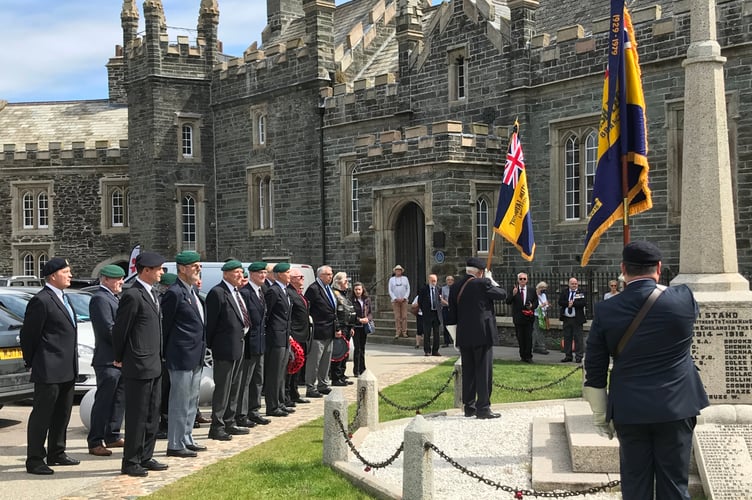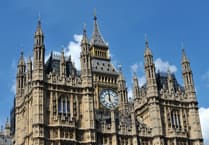It was a day for looking back. On Wednesday morning, veterans gathered at Tavistock War Memorial to mark the anniversary of the end of the Falklands War, still fresh in the minds of those who served 40 years on.
Among those gathered for the parade and wreathlaying ceremony, organised by Tavistock Royal British Legion, were local Royal Marines who served in the brief but bitter conflict with Argentina over the sovereignty of the islands in the South Atlantic.
Many had travelled to attend the national commemoration at the National Memorial Arboretum in Staffordshire or to Plymouth Hoe for the ceremony there on the anniversary itself.
As a result, Tavistock’s ceremony waited until the Wednesday morning, with a parade, procession and wreathlaying at the war memorial outside Tavistock Guildhall.
It was a moving occasion in the sunshine, with reminiscences shared as veterans gathered before the ceremony outside the Tavistock Guildhall.
Among them was Yorkie Malone from Lamerton, who served with the 45 Commando of the Royal Marines – part of 3 Commando who carried out the campaign to liberate the islands, which cost the lives of more than 250 British troops.
Yorkie led 39 men into the conflict, bringing them all back safely.

‘This time 40 years ago, I was on Sapper Hill, and they wouldn’t let us in,’ he said, remembering how bitterly cold it was on in what was the start of winter in the South Atlantic.
It was an anxious time for Yorkie’s wife Trish, who had young children at the time, April 1982, when following Argentinian troops arriving at Port Stanley, the island’s capital. British troops were dispatched at very short notice.
‘I think the wives played a very important part, being there for the men when they came home,’ said Trish. ‘It changed some people’s lives, but basically as a service wife, you support your man.’
Also at the ceremony was George Porthouse, who left his wife Christine at home in Buckland Monachorum with their young children, including a baby, to sail to the Falklands. He said the memories were still fresh.
He was serving with the 40 Commando of the Royal Marines, at that time based at Seaton Barracks in Plymouth.
Christine said: ‘My oldest was three and my youngest was just three months,’ she said. ‘With the children you try to put [the worry] on the backburner, it is about being brave for the little ones.’
Falklands veteran Chrystie Ward from Walkhampton is chairman of the local branch of the Royal Marines Association. He laid a wreath at the ceremony at Tavistock’s war memorial.
As a corporal in the Plymouth-based 42 Commando, he received the Queen’s Gallantry Medal for his part in the action in the mountains around the capital Port Stanley over the night of June 11 to 12, a key operation which led to the Argentinians’ surrender.
‘We got involved in a number of escapades around Mount Kent and Mount Harriet for which I was awarded the gallantry medal,’ he recalled.
Asked if he was scared, he said: ‘It certainly had its moments but there comes a point where you didn’t think about what was going on, you just got on with the job. It was about leading your men, and achieving your objective.’
Of being at the ceremony in Tavistock, he said: ‘It means an awful lot. I was at the National Arboretum yesterday and it was a fantastic day.
The thing that almost moved me to tears was seeing all of the young children [from the Falkland Islands].
‘They are ten years old now and their parents were born after the conflict, but it means to much of them. They remain very proud to be Falkland islanders and British.
‘That brings it home, that whilst there were many tragedies [in the war] there were a lot of successes as well and whilst we need to remember the fallen and the effects it has had on many many families, we shouldn’t forget the significant part of not only in relieving the islands but the significant part in ensuring their future.’
Also at the ceremony was Royal Marines veteran Geordie Gill, from Princetown, who was one of the 60-odd Royal Marines actually stationed on the island when the Argentinian forces invaded on April 2.
‘Our commanding officer literally said you are going to be dead by dinner time. There were some lads out there who had only been training for three or four months. We were told to take all the artillery we had and go to artillery points on the island and keep firing until we ran out.’
As someone who had lived on the Falklands during his posting, he loved the life there before the invasion. ‘You were part of the community.’
The war over the sovereignty of the islands, a British protectorate, started on April 2 when Argentinian troops invaded the islands in the South Atlantic which the British had held for 150 years. Argentina said they were rightfully reclaiming the islands, which they knew as Las Islas Molivas. The conflict lasted 74 days and ended with an Argentine surrender on 14 June, returning the islands to British control. In total, 649 Argentine military personnel, 255 British military personnel, and three Falkland islanders died during the hostilities.





Comments
This article has no comments yet. Be the first to leave a comment.